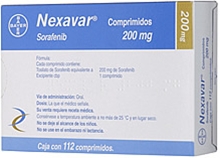Delhi HC bars export of Natco's generic cancer drug on Bayer’s plea
27 Mar 2014
The Delhi High Court has barred Natco Pharma Ltd from exporting Sorefenat, a generic medicine for the treatment of kidney and liver cancer on a plea of German drug major Bayer Corporation which, claims the patent for its original version Nexavar.
 Bayer, in its petition, has pointed out that the generic drug being made under compulsory licence is for sale in India and, thus, cannot be exported.
Bayer, in its petition, has pointed out that the generic drug being made under compulsory licence is for sale in India and, thus, cannot be exported.
Natco is the first recipient of the country's first compulsory licence (CL) on Bayer's kidney cancer drug Nexavar (See: Natco granted compulsory licence for Bayer's Nexavar). The compulsory licence allows Natco to make its generically similar version of Bayer's Nexavar on the payment of a revised 7 per cent royalty to Bayer.
The court also issued notices to the central government, the customs authorities and Natco, seeking their replies on Bayer's plea.
"Notice. Respondents 1 to 4 (Centre and others) and Respondent 5 (Natco) to file their responses in six weeks... Respondents 1 to 4 are directed to ensure that no consignment from India containing Sorefenat, covered by compulsory licence, is exported," the court said and listed the matter for further hearing on August 11.
Justice Manmohan, however, allowed Natco to seek the court's permission to export the drug as and when it gets nod from the Drug Controlling Authority.
Bayer also sought directions to the customs authorities to seize and confiscate the consignment containing Sorafenat manufactured by Natco Pharma under compulsory licence granted by the patent office on 9 March 2012.
Senior advocate Mukul Rohatgi contended on behalf of Bayer that the compulsory licence was granted specifically for making and selling the drug "within the territory of India".
Natco's counsel Anand Grover submitted that the company has been selling the drug Sorefenat only in India and that it cannot be faulted in the event purchasers and retailers of its medicine sell it abroad.
Sorafenat, like Bayer's Nexavar, is used to treat a type of kidney cancer called advanced renal cell carcinoma as well as liver cancer.




















